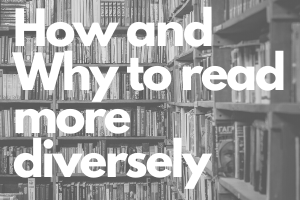
What does "reading diversely" mean?
Reading Diversely means making an intentional decision to include works from BIPOC (black, indigenous, people of color) and LGBTQ authors as a part of your normal reading throughout the year, in addition to occasionally picking a book from outside your comfort zone, such as a novel from a different genre than a genre you naturally gravitate toward.
How and why to read diversely
Reading is an expressway to learning about the world from the small corner of it we all get to live in. You miss the opportunity to find yourself in characters that do not look like you when you only ready books with characters that look like yourself. There are tons a great titles from people of all walks of life that are highly enjoyable to read. Consider starting by reading a book or two a year from a BIPOC or LGBTQ author. Reading books and talking about books by BIPOC authors will help encourage others to do the same. If we are all creating space and demand for works by BIPOC authors the literary world will become more inclusive.
Don’t just take my word for it. The following blogs make some excellent points.
“How to read more diversely” talks about how not noticing the cultural background of the authors you are reading is a form a privilege. If you are white, able-bodied, and cis gendered, most books published may mirror a similar background as the one that you come from. If you are Black, LGTBQ, Hispanic, disabled, or a different ethnicity, most books published in America today do not.
“The logical fallacy of not reading diversely” mentions the example of a book club discussion where a person at the meeting mentions that the author of The Mothers by Brit Bennett doesn’t point out that most of the characters are black, but does point out the background of characters who are not black, and why this comment matters.
“Reading Diversely – a year of not reading white men” is a chronology of someone who made it a goal for a year to read books that were by people who were not white men. Read their introduction about why they did it and their final thoughts year and wrap up.
And finally, in “How does reading diversely make you an ally?” the blogger discusses if making the conscious decision and action steps of reading more diversely makes you an ally to marginalized communities, and decides that it in and of itself is not quite enough. Talk about diverse books with others and allow yourself to learn from them.
Diversity in Publishing
American book publishing has a strong role in influencing and reflecting American culture and serve in a “gatekeeper” role, deciding which stories get promoted and which are cast aside. Popular books today are often given a second life as a TV show or a movie, amplifying a title’s reach across mediums. Representation in American pop culture matters.
In the 2019 survey of publishing house employees, the publishing industry is still overwhelmingly white, cis gendered, straight, non-disabled, and female, and it isn’t changing quickly enough. Attention has been drawn to diversity in children’s books, thanks to campaigns such as We Need Diverse Books, for the last several years. There have been increases in the number of children’s books about BIPOC. However, these gains did not translate to children’s books by BIPOC. Controversies in adult literature, such as the recent conversations about the cultural accuracy of non-white character story arcs and depictions in American Dirt, work to highlight greater issues. Literary publications do not feature as many women reviewers as they do men. Women, and more specifically women of color, do not win major book prizes as often as white men. And, authors of color often do not receive the same book advances from publishing houses as white men and women.
BIPOC authors have created scholarships to fund publishing internships for students of color that may be unable to accept an unpaid internship otherwise and have been campaigning for more diversity in the industry. Creating a more diverse employee base in publishing houses is a start toward amplifying diverse voices by widening the publishing house worldview. Initiatives such as #ownvoices and #DVpit also help to highlight authors from marginalized communities in the publishing selection process.
BIPOC Book Recommendations
Please enjoy this list of selected adult titles available in the Lake Forest Library by and about BIPOC, separated by genre, and linked to the Lake Forest Library catalog. For descriptions of some of these books, watch this blog’s companion Instagram TV post at https://www.instagram.com/p/CCokOzwnUFa/
Mystery/Thriller
- The Paper Lawyer by Carlos Cisneros
- A Burning by Megha Majumdar
- Winter Counts by David Heska Wanbli Weiden (to be released in August)
- The Lost Ones by Sheena Kamal
- I know a Secret by Tess Gerritsen
Sci-Fi/Fantasy/Horror
- The Only Good Indians by Stephen Graham Jones
- The City of Brass / The Kingdom of Copper / The Empire of Gold by S. A. Chakraborty
- The Power by Naomi Alderman
- Severance by Ma Ling
- Binti by Nnedi Okorafor
Romance
- The Bride Test by Helen Hoang
- Get a Life, Chloe Brown by Talia Hibbert
- Girl Gone Viral by Alisha Rai
- The Chai Factor by Farah Heron
- An Extraordinary Union by Alyssa Cole
Literary Fiction
- A Tale for the Time Being by Ruth Ozeki
- The Leavers by Lisa Ko
- The Lowland by Jhumpa Lahiri
- Stay with me by Ayobami Adebayo
- An American Marriage by Tayari Jones
- Homegoing by Yaa Gyasi
- A Thousand Splendid Suns by Khaled Hosseini
- Such a Fun Age by Kiley Reid
- If You Leave Me by Crystal Hana Kim
- The Vegetarian by Han Kang
- The Brief Wondrous Life of Oscar Wao by Junot Diaz
- There There by Tommy Orange